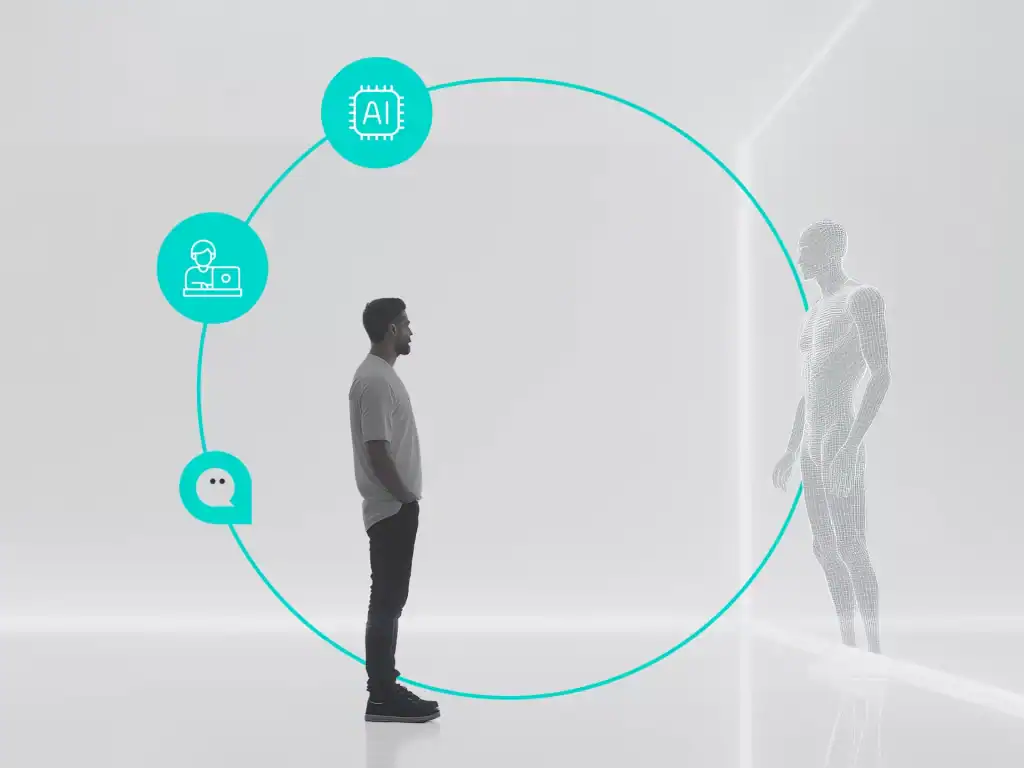Understanding Omnichannel in the Healthcare Sector
Understanding omnichannel in the healthcare sector is a crucial step in improving accessibility, efficiency, and overall patient experience by creating a patient-centered care system that adapts to the increasingly pervasive digital lifestyle. Through an omnichannel approach, patients can access healthcare information and services consistently and personalized across different devices and touchpoints, promoting two-way communication, enabling patients to communicate with care providers, and receive timely and relevant responses.
Defining the Concept of Omnichannel in the Healthcare Sector
Omnichannel in the healthcare sector refers to the integration of all communication channels used by a healthcare organization to engage patients. This approach allows users to access healthcare information and services consistently and personalized across different devices and channels.
What are the Benefits of an Omnichannel Approach in the Healthcare Sector?
The adoption of an omnichannel approach in the healthcare sector offers numerous benefits. Patients can enjoy an integrated experience, from appointment booking to visit management and post-treatment communications. Furthermore, omnichannel enhances operational efficiency, enables better resource management, and fosters patient engagement.
Challenges and Considerations in Implementing an Omnichannel Healthcare Strategy
Implementing an omnichannel strategy in the healthcare sector also presents some challenges. Ensuring system and data integration to enable a unified view of patients and seamless communication is necessary. Moreover, addressing concerns regarding privacy and security of healthcare data is essential.
Building an Omnichannel Healthcare Strategy
Building an omnichannel strategy in healthcare is essential: a well-designed strategy allows healthcare organizations to deliver high-quality services through a variety of communication channels. However, it requires time, resources, and a constant commitment to meeting the needs of patients in an ever-evolving digital environment. Nevertheless, adopting an omnichannel approach can lead to significant improvements in customer experience and operational efficiency in healthcare.
Key Components of an Omnichannel Strategy in Healthcare
Certainly, creating such a solution requires careful planning and consideration of various key elements.
- Identifying the most relevant communication channels: understanding which channels are most useful for the target audience is crucial. These may include websites, mobile apps, messaging, social media, and more.
- System and data integration: it is necessary to enable a unified view of patients regardless of the channel used. This means patients should be able to access their information and services consistently without having to repeat the same information every time they interact with the healthcare organization.
- Proper resource and staff management: coordinating activities across different channels and ensuring care providers are adequately trained to deliver quality care through various touchpoints.
- Data collection and analysis: these are fundamental to evaluate the effectiveness of the omnichannel strategy and make any necessary improvements. By monitoring patient interactions across different channels, valuable insights can be obtained to further personalize the experience and adjust communication strategies.
How Can You Use Technology to Create an Omnichannel Strategy?
Technology plays a fundamental role in creating an omnichannel strategy in the healthcare sector. Implementing solutions like XCALLY, a customer service platform, allows for efficient management of patient interactions across multiple channels. XCALLY offers advanced features for call routing, monitoring and analysis, chat, and messaging, enabling the delivery of an integrated and high-quality care experience.

The Role of AI in Next-Generation Healthcare
Artificial intelligence (AI) is revolutionizing the healthcare sector, opening new opportunities to improve the quality of care, operational efficiency, and patient experience. In the next-generation healthcare, AI will play an increasingly central role, supporting healthcare professionals and transforming care delivery. By leveraging AI responsibly and strategically, it is possible to create a more efficient, personalized, and patient-centered healthcare system.
How is AI Useful in Healthcare?
AI can be utilized in various areas of healthcare, such as medical diagnosis, healthcare data management, treatment planning, and personalized assistance. Thanks to its ability to analyze large amounts of data quickly and efficiently, artificial intelligence can help doctors identify more accurate diagnoses, predict disease progression, and suggest personalized treatment options.
Additionally, AI can play a crucial role in healthcare data management. Through intelligent algorithms, it can analyze and organize patient data to provide relevant information and support clinical decision-making. This enables healthcare professionals to access crucial information promptly and improve interdisciplinary collaboration.
What are Some Applications of AI in an Omnichannel Healthcare Strategy?
Another important aspect of AI in next-generation healthcare is personalized care. AI can be used to create remote monitoring tools, wearable devices, and interactive chatbots that provide personalized support and advice to patients. These tools enable more effective management of health conditions, reduce the need for hospital visits, and enhance patient empowerment in self-care.
Challenges in implementing an omnichannel healthcare strategy:
Overall, the implementation of an omnichannel strategy presents a series of challenges and considerations that require attention to ensure the success of the company in delivering a consistent and high-quality experience across all communication channels. Some of the common challenges include the complexity of system integration, staff training, data and information management, and adaptation to patients’ needs and preferences.
Information Sharing and Resource Management:
Companies often operate with separate systems and platforms for different channels, making it difficult to interconnect and synchronize data. It is crucial to invest in creating a robust technological infrastructure that allows real-time data integration and information sharing across channels.
As already mentioned, an omnichannel strategy requires adequate planning of human, financial and technological resources to support the implementation and maintenance of the different communication channels. It is essential to allocate resources in a balanced manner and carefully consider the costs associated with channel implementation and management, including staff training and technology updates.
Consistency of Customer Experience
A seamless and consistent interaction between different channels is essential in an omnichannel strategy, allowing customers to transition between channels without losing information or having to repeat their requests. It is necessary to ensure that customer data and information are accessible across all channels, and agents are capable of delivering a consistent and personalized service regardless of the channel used.
Ethical Concerns in AI Adoption in Healthcare
The use of AI in healthcare raises ethical concerns. Ensuring patient data privacy and security is crucial, as well as considering the social and economic impact of AI adoption. Developing appropriate policies and regulations to ensure responsible and ethical use of AI in the healthcare sector will become indispensable in the near future.
Opportunities and Maximizing Them
Despite the challenges, implementing an omnichannel strategy in the healthcare sector offers numerous opportunities. Healthcare organizations can enhance patient experience, optimize internal processes, reduce costs, and create new revenue streams. To maximize these opportunities, it is important to adopt innovative technological solutions, collaborate with strategic partners, and maintain a constant focus on listening to patients.
XCALLY and Omnichannel in the Healthcare
In this context, XCALLY, an advanced contact center and customer experience solution, plays a fundamental role in implementing effective omnichannel strategies to improve the efficiency and quality of healthcare services.
With XCALLY, healthcare facilities can integrate various communication modes such as phone, chat, email, SMS, and social media into a single centralized system. This allows patients to choose their preferred communication channel and receive quick and personalized assistance, regardless of the device or platform used.
- A significant advantage of XCALLY is its ability to intelligently manage patient information. Through integration with healthcare information management systems, XCALLY can access real-time patient data, providing comprehensive context to contact center agents. This enables personalized service, reduces wait times, and improves overall patient satisfaction.
- Furthermore, XCALLY offers intelligent routing capabilities, automatically directing patient requests to the appropriate healthcare staff based on required expertise or condition severity. This optimizes resource allocation, reduces response times, and ensures efficient workflow and better emergency management.
- Data security is crucial in the healthcare sector, and XCALLY provides robust security measures to protect sensitive patient information. Data access is limited to authorized personnel, and encryption and compliance with data privacy regulations such as the General Data Protection Regulation (GDPR) in Europe are implemented.
- Lastly, XCALLY offers advanced analytics and reporting tools that allow healthcare facilities to monitor contact center performance, service metrics, and patient satisfaction. These insights can be used to identify areas for improvement, optimize processes, and provide increasingly efficient and effective care.
Conclusions
While an omnichannel healthcare strategy presents challenges, it also offers numerous opportunities to improve patient experience and organizational efficiency in healthcare. Choosing the right technology, such as XCALLY, and strategically addressing challenges will enable healthcare organizations to deliver integrated, personalized, and high-quality care to patients across all communication channels.






